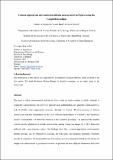Files in this item
Context-appropriate environmental attitude measurement in Africa using the Campbell paradigm
Item metadata
| dc.contributor.author | Ogunbode, Charles Adedayo | |
| dc.contributor.author | Henn, Laura | |
| dc.contributor.author | Tausch, Nicole | |
| dc.date.accessioned | 2019-10-24T23:36:32Z | |
| dc.date.available | 2019-10-24T23:36:32Z | |
| dc.date.issued | 2018-10-25 | |
| dc.identifier | 256498749 | |
| dc.identifier | 52dde51d-c077-44d4-a315-97aa9d3e9ecb | |
| dc.identifier | 85055743526 | |
| dc.identifier | 000515354000022 | |
| dc.identifier.citation | Ogunbode , C A , Henn , L & Tausch , N 2018 , ' Context-appropriate environmental attitude measurement in Africa using the Campbell paradigm ' , Environment, Development and Sustainability , vol. In press . https://doi.org/10.1007/s10668-018-0281-1 | en |
| dc.identifier.issn | 1573-2975 | |
| dc.identifier.other | ORCID: /0000-0002-9471-0673/work/50460128 | |
| dc.identifier.uri | https://hdl.handle.net/10023/18762 | |
| dc.description | The preparation of this article was supported by a Santander Research Mobility Grant awarded to the first author. | en |
| dc.description.abstract | The need to tailor environmental policies in Africa with an understanding of public attitudes is commonly acknowledged, but efforts to generate such understanding are generally constrained by a lack of reliable context-appropriate measures. Attempts to ‘borrow’ Western measures in African research are typically undermined by the cross-cultural inequivalence of constructs and theoretical models. Consequently, we tested the potential of the Campbell paradigm – an approach that enables context-specific adaptation of attitude measurement, among a Nigerian sample (N = 543). Data were gathered with a questionnaire survey. Our findings show that a context-appropriate environmental attitude measure can be obtained by assessing the behaviours and intention statements Nigerians execute in response to environmental issues. On average, pro-environmental attitude levels among our sample was characterised by professed intentions to perform the most difficult behaviours and actual engagement in the least difficult behaviours. The environmental attitude measure derived using the Campbell paradigm is positively related to other conventional attitude indicators including the perceived threat of climate change, concern, efficacy beliefs and acceptance of responsibility for mitigation. We conclude that the Campbell paradigm offers a viable avenue to proceed beyond simple assessments of professed environmental attitudes to more accurate evaluations of Africans’ disposition to strive for the achievement of ecological goals in difficult circumstances. | |
| dc.format.extent | 266811 | |
| dc.language.iso | eng | |
| dc.relation.ispartof | Environment, Development and Sustainability | en |
| dc.subject | Attitude measurement | en |
| dc.subject | Environmental attitudes | en |
| dc.subject | Attitude–behaviour gap | en |
| dc.subject | Africa Cultural sensitivity | en |
| dc.subject | GE Environmental Sciences | en |
| dc.subject | NDAS | en |
| dc.subject | SDG 13 - Climate Action | en |
| dc.subject.lcc | GE | en |
| dc.title | Context-appropriate environmental attitude measurement in Africa using the Campbell paradigm | en |
| dc.type | Journal article | en |
| dc.contributor.institution | University of St Andrews. School of Psychology and Neuroscience | en |
| dc.identifier.doi | https://doi.org/10.1007/s10668-018-0281-1 | |
| dc.description.status | Peer reviewed | en |
| dc.date.embargoedUntil | 2019-10-25 | |
| dc.identifier.url | https://link.springer.com/article/10.1007%2Fs10668-018-0281-1#SupplementaryMaterial | en |
This item appears in the following Collection(s)
Items in the St Andrews Research Repository are protected by copyright, with all rights reserved, unless otherwise indicated.

